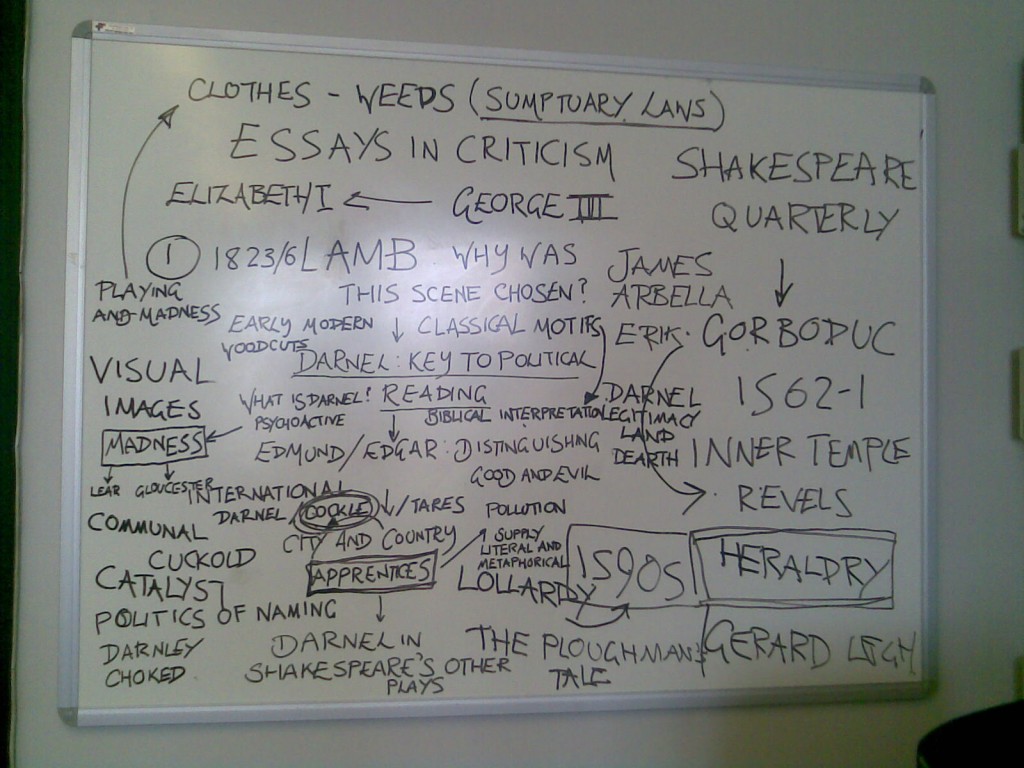We are Jayne Archer, Richard Marggraf Turley and Sid Thomas. Since about 2007 we have been discussing, arguing, researching, lecturing, writing and publishing together about literature, sustenance and dearth. By way of an introduction to our new blog, here’s the story of how our association came about.
It began, as many good things do, with a conversation in the pub. Richard and Sid, having been recently introduced, were explaining the day job to each other (literary scholar and plant scientist respectively). The dialogue turned to plants and literature, and the subject of the cause of King Lear’s madness came up. Some ideas began to form – but were they just pub ideas and would they have any value beyond closing time?
What was needed was an expert on Shakespeare and early modern food, diet and medicine, which just happened to describe Richard’s colleague Jayne. A couple of days after the encounter in the pub, all three of us met over coffee. Jayne reassured Richard and Sid that their beer-fuelled conversation might indeed have stumbled on a novel insight into Shakespeare’s times and experiences. As we talked this over, it soon became clear that we had the makings of productive alchemy through blending the distinctive academic viewpoints of an early modernist, a Romanticist and a Geneticist.
Our backgrounds turned out to be highly complementary and compatible:
Jayne Elisabeth Archer is a Lecturer in the Department of Performing Arts and English, University of Bedfordshire. Her research interests include alchemy, food, science and the pseudo-sciences in literature from the early modern period to the 19th century. She is general editor of John Nichols’s The Progresses and Public Processions of Queen Elizabeth I: A New Edition of the Early Modern Sources, 5 vols (OUP, 2014), and has edited two essay collections, The Progresses, Pageants and Entertainments of Queen Elizabeth I (OUP, 2007) and The Intellectual and Cultural World of the Early Modern Inns of Court (MUP, 2010).
Richard Marggraf Turley is Professor of English Literature in the Department of English and Creative Writing, Aberystwyth University, and he is the University’s Professor of Engagement with the Public Imagination. He is the author of several monographs and articles on Romanticism, including Keats’s Boyish Imagination (Routledge, 2004) and Bright Stars: John Keats, Barry Cornwall and Romantic Literary Culture (Liverpool University Press, 2009). He is also the author of a novel set in the Romantic period, The Cunning House (Sandstone, 2015).
Howard Thomas (Sid) is Emeritus Professor of Biological, Environmental and Rural Sciences at Aberystwyth University and a Fellow of the Learned Society of Wales. He has held visiting professorships at universities in Switzerland and the United States. His research interests include the genetics, evolution and uses of food plants. He also has a special interest in the cultural significance of scientific research and promotion of links between science and the arts. He is co-author of The Molecular Life of Plants (Wiley/ASPB, 2013)
Over the course of many subsequent rounds of coffee (and not a few buns), we developed a novel line of argument concerning Shakespeare’s intentions for the dramatic form and substance of ‘King Lear’. We did it by close reading of primary written sources and analyses of their historical and socio-economic contexts, in combination with insights from contemporary plant science and agri-environmental research. The fruits of this exercise in transdisciplinary cross-pollination include a growing number of academic publications, presentations at several conferences and public events and a flood of media interest, culminating in a forthcoming book that brings it all together – of which, more later.
The successful assault on ‘King Lear’ convinced us that our collaboration had developed an approach, a kind of analytical toolkit, that potentially could be applied to other works in the literary canon: as we describe in subsequent blogs.
Publications on Shakespeare:
JE Archer, R Marggraf Turley, H Thomas. 2013. Reading with the Grain: Sustainability and the Literary Imagination. INSPIRE-ASLE-UKI Essay Competition Winner (the prize was the opportunity to deliver the INSPIRE-ASLE-UKI lecture at the 2013 Hay-on-Wye Festival – here’s a video of the event)

